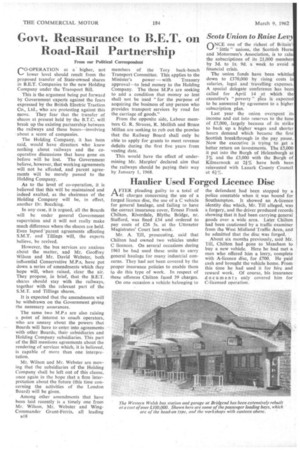Govt. Reassurance to B.E.T. on Road-Rail Partnership
Page 52

If you've noticed an error in this article please click here to report it so we can fix it.
From our Political Correspondent
(-0-OPERATION at a higher, not
lower level should result from the proposed transfer of State-owned shares in B.E.T. Companies to the new Holding Company under the Transport Bill.
This is the argument being put forward by Government experts against the fears expressed by the British Electric Traction Co., Ltd., who are protesting against this move. They fear that the transfer of shares at present held by the B.T.C. will break up the existing partnership between the railways and these buses—involving about a score of companies.
The Holding Company, it has been said, would have directors who knew nothing about railways and the cooperative discussions that have gone on before will be lost. The Government believe, however, that working agreements will not be affected, and parent agreements will be merely passed to the Holding Company.
As to the level of co-operation, it is believed that this will be maintained and indeed exalted, as the chairman of the Holding Company will be, in effect, another Dr. Beeching.
In any case, it is argued, all the Boards will be under general Government supervision and it will not really make much difference where the shares are held. Even lapsed parent agreements affecting S.M.T. and Tangs will, the experts believe, be revived.
However, the bus services are anxious about the matter, and Mr. Geoffrey Wilson and Mr. David Webster, both influential Conservative M.P.s, have put down a series of amendments which they hope will, when raised, clear the air. They propose, in brief, that the B.E.T. shares should stay with the railways, together with the relevant part of the S.M.T. and Tillings shares.
It is expected that the amendments will be withdrawn on the Government giving the necessary assurances.
The same two M.P.s are also raising a point of interest to coach operators, who are uneasy about the powers that Boards will have to enter into agreements with other Boards, their subsidiaries and Holding Company subsidiaries. This part of the Bill mentions agreements about the rendering of services which, it is believed, is capable of more than one interpretation.
Mr. Wilson and Mr. Webster are moving that the subsidiaries of the Holding Company shall be left out of this clause, once again in the hope that a firm interpretation about the future (this time concerning the activities of the London Board) will be given.
Among other amendments that have been laid recently is a timely one from Mr. Wilson, Mr. Webster and WingCommander Grant-Ferris, all leading
B 1 8
members of the Tory back-bench Transport Committee. This applies to the
Minister's power — with Treasury approval—to lend money to the Holding Company. The three M.P.s are seeking to add a condition that money so lent shall not be used "for the purpose of acquiring the business of any person who provides transport. services by road for the carriage of goods."
From the opposite side, Labour members G. R. Strauss, R. Mellish and Bruce Milian are seeking to rub out the proviso that the Railway Board shall only be able to apply for grants to meet revenue deficits during the first five years from vesting date.
This would have the effect of undermining Mr. Marples' declared aim that the railways should be paying their way by January 1, 1968.




































































































































